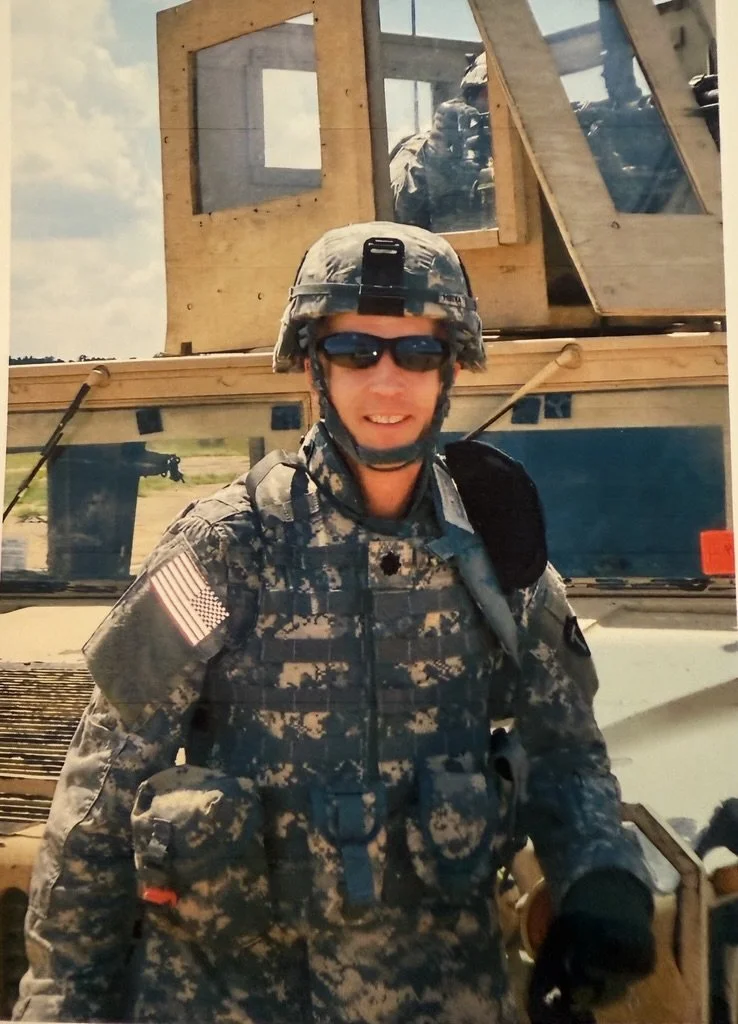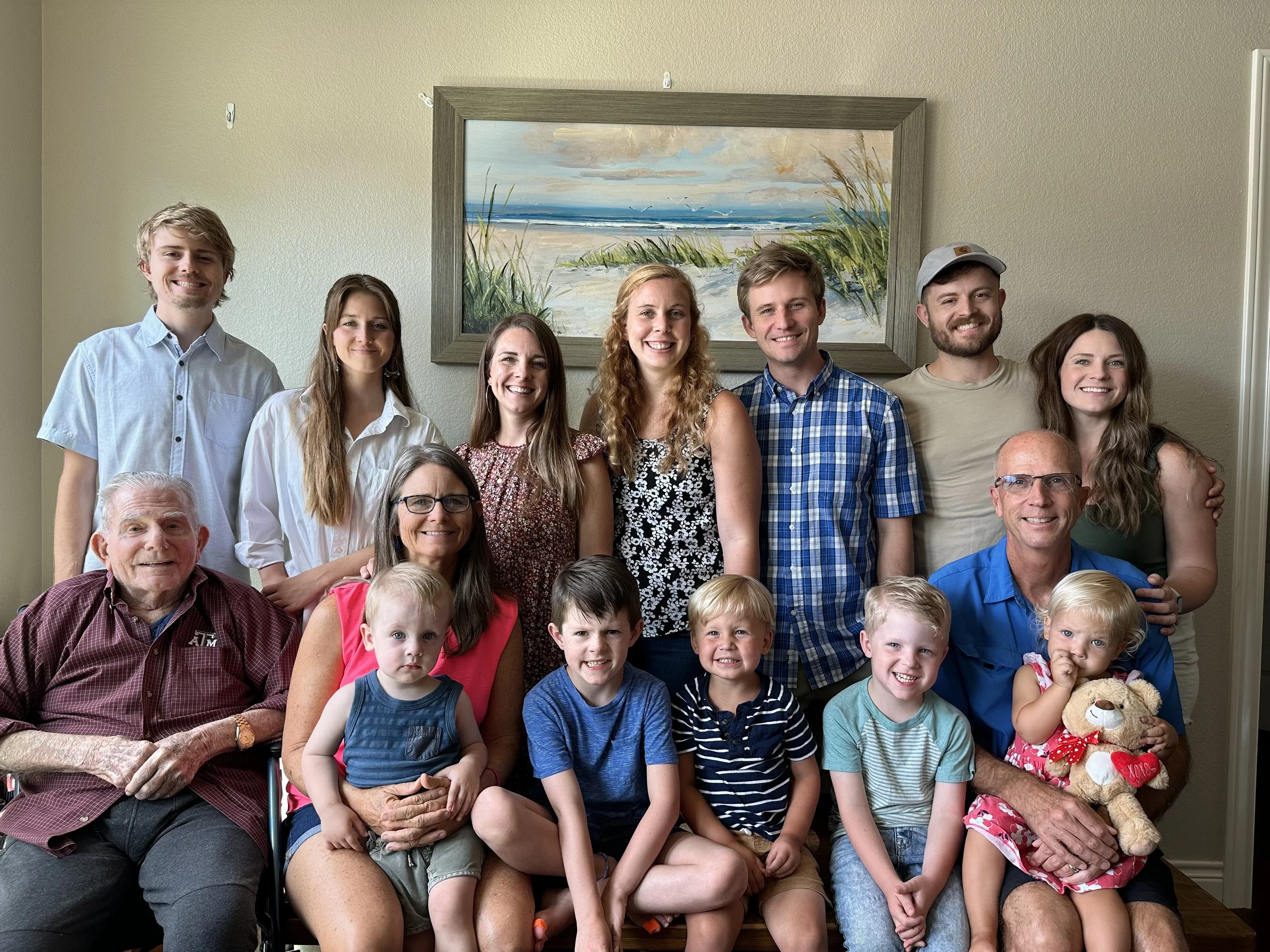For God and Country: A Chaplains Journey
From a small town in South Dakota to the sand swept landscapes of Iraq, this story will prove the power of suggestion and pose a question you may have never considered before.
River Raised: The Early Years
In the back of a convoy, Chaplain Bruce Postma sat quietly, bible in hand next to soldiers tightly gripping their rifles as the thick black night wrapped around them. He was a long way from home but had never felt closer to God; his mission field–the men and women sitting next to him.
Born and raised in Platte, South Dakota, Bruce spent his childhood fishing the Missouri River, hunting, and helping his father with carpentry or farm work. By the age of five, he was already learning the value of a dollar and the grit of a hard day’s labor.
At thirteen, he watched his parents’ marriage nearly collapse under the weight of alcohol—until family stepped in, and healing followed. That early lesson in brokenness and restoration would mark his life, preparing him for the work he would one day do among soldiers whose battles weren’t only on the front lines, but in their homes and hearts.
It was around this time that Bruce attended an outreach program where a film was shown to teach the message of Christ. Gripped by the weight of his sin, Bruce was among the first to step forward as the altar call began. He accepted Christ as his Savior, and in that moment, the trajectory of his life was forever altered.
From Hammer to Helmet
By the time high school rolled around, Bruce was weighing his options for life after graduation. College wasn’t on his radar, but with his carpentry experience, he felt confident he could build a solid career in that trade. He enrolled in vocational agriculture classes, where his instructor quickly noticed his potential and encouraged him to consider becoming an instructor himself.
“That's really all it took, was one person that I looked up to, to encourage me to consider that.” Coming from a modest background, Bruce knew the cost of college would be a significant hurdle. He would need a plan to make it possible.
“My father had been in the Army National Guard and I had known other people who were getting into it—it was a way to pay for college once that was the plan.” He joined the Army at the ripe age of 17 and one year later was taking classes at South Dakota State University; fresh out of basic training and ready for the next chapter to begin.
Bruce’s mentor Jan, the college and career fellowship leader at his church and a Captain in the infantry, encouraged Bruce to attend Campus Crusade for Christ’s (now called Cru) Conference they did every Christmas. This proved to be a pivotal experience that sparked a deep and lasting commitment to the organization.
Life, Love, and a Calling
The summer before graduation, Bruce participated in Cru’s project in Yellowstone National Park where he would meet his future wife, Lee. In a whirlwind romance, Bruce and Lee would be engaged 6 months later and married just 5 months after that. Bruce had applied for active duty in his senior year thinking he would see the world while he was young. “I saw Fort Hood.” he said through a chuckle.
In the years that followed, Bruce stayed active with Cru and eventually joined the staff as an associate, serving in military ministry at Fort Hood. His future seemed secure and the path ahead was clear until a weekend trip to Texas A&M for a Cru reunion changed everything.
“We had known about a cadet named Steve who was in the CORPS at A&M and he invited me to walk around the CORPS with him and told me they needed someone to come and minister to the men and women there.” With another unexpected nudge in a direction he hadn’t planned, Bruce left active duty in 1986. With Lee at his side, they moved to College Station, Texas to begin full-time ministry with the CORPS through Cru. He spent five and a half years sharing the gospel and helping cadets grow in their faith.
While Bruce was at A&M, news broke that Saddam Hussein had invaded Kuwait — and suddenly, a conversation from his Fort Hood days came rushing back. His colonel had once suggested he consider the path of a military chaplain. Amid the growing unrest, that call to ministry grew louder, and Bruce realized it was time to answer it.
By the time Bruce graduated from Dallas Theological Seminary in August 1994, he and Lee were raising three young children. He began serving as a reserve chaplain while answering the call to full-time ministry with Cru and a church in College Station, where he pastored for several years. They purchased a modest home in Bryan and the Postmas’ family continued to grow.
Then 9/11 happened, and the world they had known was thrown into chaos. By 2002, Bruce was mobilized to active duty and over the next 7 years would do 3 tours, finalizing in Iraq around 2009. As a senior chaplain, his job was to ensure each unit was deploying with a chaplain in tow.
Witnessing and War
Meanwhile, his family was thousands of miles away in the States, holding on to hope for his safety each day they went without hearing from him. Lee fondly remembered a time Bruce guided her through fixing their refrigerator’s ice maker over the phone—a lighthearted moment tucked into the many years of overseas tours and separations.
Most of his time in Iraq was spent in an office within a chapel on Victory Base in Baghdad. As a chaplain, one of his roles was to spiritually guide men and women through the rough patches in their lives and marriages—a chance to offer the kind of support he had been too young to give his own parents when their relationship was on the brink. It was, in many ways, a full-circle moment.
I asked Bruce what it was like in Iraq, where he spent 9 months during his last overseas tour. “Everyone gets into their battle rhythm–get out of bed, do your workout, get breakfast, and then go wherever your job is. I’d have staff meetings, meetings with soldiers–I would go on convoys from time to time to visit other chaplains because I was a brigade chaplain and I had battalion chaplains in other parts of Iraq.”
By the grace of God, Bruce was protected from any active combat.
By the time he retired from the Army National Guard as a Colonel in May of 2012, he had received every top honor a Chaplain could be awarded.
Property and People: Investments in the Future
In retirement, Bruce began exploring investment opportunities and saw real estate as the perfect place to start.“We sent 8 letters to our immediate neighbors because I thought, ‘if I’m going to own a second property I don't want it to be across town. I’d rather it be close by so I can manage it’–The long term vision was that property appreciates so it’s a good investment.”
It started as one neighbor selling their home to them after deciding to move into a senior living facility, and it was a snowball effect from then on. More neighbors began to move away or move into retirement homes and Bruce and Lee were able to purchase 7 homes over the next several years.
What began as a ministry — opening their homes to friends, church family, and missionaries in need — eventually grew into a sizable business venture as they were able to use all 7 homes, at various times, as short-term rentals. Bruce beamed as he told me, “I love short term rentals, I love hospitality, I love being able to make a weekend as memorable and comfortable as possible for our guests.”
In 2024, they sold 3 of their homes in order to have a more manageable portfolio. “Part of it is having enough time to process and think what can we do to make it better–Part of that philosophy comes from a commander I had when I was in Kosovo. He would tell the staff, ‘What can you do each day to improve your area?’ so I’ve adopted that philosophy–The other part is that I want to be a good steward of what I’ve been given.”
“I look at life in seasons.” He said to me as he looked back on the many years of service to God, his family, and his country. “Ministry has always been a part of my life–It doesn’t really matter what I do, ministry will always be a part of it–it’s my DNA.”
I asked Bruce what was next for him and Lee: “However long we are here, we want to disciple because out of discipling, evangelism will occur because it becomes who you are. And then church planting is essentially what happens when enough people are getting together consistently. You don’t have to ‘plant’ a church because you are one. You just are.–Jesus kept it pretty simple so we should too.”
The Challenge
Bruce’s life is an example of true dedication and sacrifice. With many turns and redirections, he found himself in places he never dreamed he would be; all the while keeping his faith and never losing sight of his true mission—winning souls for Christ. His willingness to trust God with every blind step forward is inspiring and leaves a lasting impression.
Have you ever asked yourself what God might be calling you to? Or better yet, have you ever truly pondered what, and more importantly, who God is? I am certainly as biased as they come in regard to this subject, as I gave my life to Christ many years ago, but even so, I encourage you to consider the thought. I recognize that not everyone has had a warm and fuzzy experience with religion or certain church-related things; even I’ve had my own ups and downs with the body of Christ.
The brick and mortar church is made of imperfect people, and mistakes are made often. Hospitals don’t always treat the sick and injured with the right medicine, but if we were to toss out all doctors and all medical facilities for that reason alone, we’d be in a world of hurt— literally. So, who is God? Only He can answer that question, and if you give him the opportunity, He will do just that.





